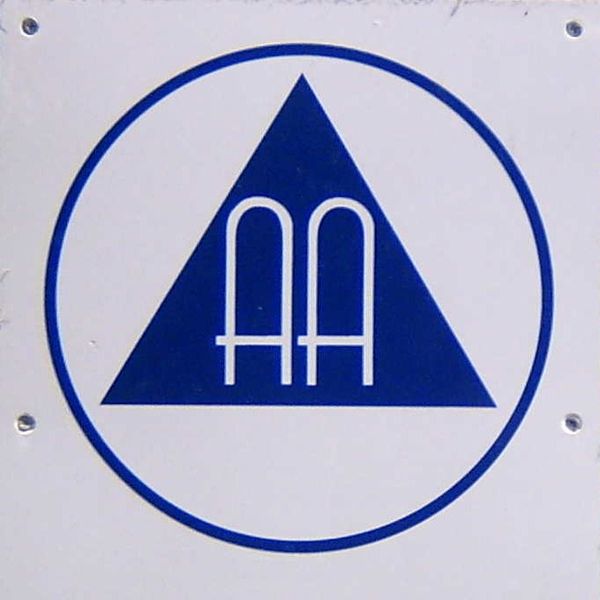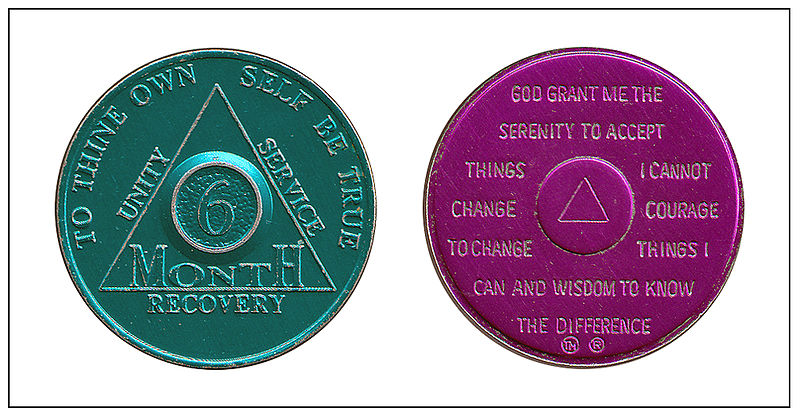The 12 Traditions of Alcoholics Anonymous
Alcoholics Anonymous is not simply a support group; it’s a community! The first one was established in 1935 by Bill Wilson and Dr. Bob Smith. It is a lifeline for many alcoholics and is popularly known as AA. For AA, the backbone is composed of the 12 Steps program. It serves the members as a beacon in their journey to sobriety and self-development. However, there is something else that is often forgotten-the 12 Traditions of Alcoholics Anonymous. They do not only dictate how the group operates, but they also provide glimmer of hope to those who wish to overcome their difficulties. Every tradtion is explored and dissected here from different angles and how they contribute to the recovery process is examined.
Tradition 1: Our Common Welfare should come first; personal recovery depends upon AA unity

, , via Wikimedia Commons
Unity within Alcoholics Anonymous (AA) stands as the bedrock of its efficacy, echoing the sentiment that the welfare of the collective must precede the concerns of the individual. Acknowledging this tenet as the linchpin of their success, members embrace the idea that fostering a sense of togetherness and camaraderie propels them toward their shared objective of sobriety. Operating within the area of addiction rehabilitation, this principle not only promotes a cohesive and supportive environment but also serves as a beacon of hope for those navigating the complexities of personal recovery. How does this tradition cultivate an environment conducive to sustained sobriety?
Here are some key points:
- Promoting a culture of mutual support and understanding
- Fostering an atmosphere where members feel accepted and valued
- Encouraging open dialogue and the sharing of personal experiences
- Instilling a sense of accountability and responsibility within the community
Tradition 2: For our group purpose, there is but one ultimate authority—a loving God as He may express Himself in our group conscience. Our leaders are but trusted servants; they do not govern

A 36-year Sobriety Coin. , , via Wikimedia Commons
This tradition underscores the core values of humility and selflessness that form the backbone of the organization. By adhering to this principle, the AA leadership operates as trusted stewards, eschewing any inclination toward authoritative governance. This unique approach fosters an environment where individual egos dissolve in the pursuit of communal welfare, allowing the spiritual ethos of the program to flourish. Consequently, the collaborative efforts within AA reflect a sacred dedication to the shared journey of recovery, where the guiding hand of a collective conscience serves as a beacon of hope for those seeking solace and redemption.
Tradition 3: The only requirement for AA membership is a desire to stop drinking.

Image by from
In the world of recovery, this tradition stands as a beacon of inclusivity. It boldly declares that the sole criterion for becoming a member of Alcoholics Anonymous is a genuine yearning to break free from the shackles of alcoholism. In simpler terms, if you earnestly wish to conquer your alcohol addiction, the doors of AA swing open for you, no matter your story, your history, or your background.
This commitment to a ‘come as you are’ ethos reflects the heart and soul of AA. It embodies the adage, ‘Don’t judge a book by its cover,’ underlining the principle that recovery knows no bounds and discriminates against none. This tradition personifies the embrace of diversity and shatters any notion that you have to meet certain preconditions to belong.
Tradition 4: Each group should be autonomous except in matters affecting other groups or AA as a whole
In Alcoholics Anonymous (AA), the principle of autonomy is paramount, serving as the cornerstone of its flexibility and resilience. Here, individual groups operate independently, making decisions that cater to the specific requirements of their members. This decentralized structure fosters a sense of ownership and accountability within each local community, nurturing a supportive environment for recovery.
Yet, amidst this independence, the notion of unity acts as the cohesive force binding AA together. When confronted with issues that have implications beyond the confines of a single group, the collective integrity of the entire AA network takes precedence, emphasizing the significance of communal harmony and shared purpose.
Tradition 5: Each group has but one primary purpose—to carry its message to the alcoholic who still suffers

Image by from
Amidst the fabric of Alcoholics Anonymous (AA), there exists a vital principle that each group should embrace ardently – the singular primary purpose to carry its transformative message to the alcoholic who is yet to find solace. This principle serves as the compass guiding the collective endeavor of AA groups, ensuring that the paramount objective remains unwavering: to extend a supportive hand to those entangled in the throes of alcohol addiction.
In essence, Tradition 5 serves as a poignant reminder that the essence of the AA community lies not just in individual rehabilitation but in the shared responsibility of being a beacon of hope for those grappling with the clutches of alcohol addiction.
Tradition 6: An AA group ought never endorse, finance, or lend the AA name to any related facility or outside enterprise, lest problems of money, property, and prestige divert us from our primary purpose

, , via Wikimedia Commons
In the intricate fabric of the principles that underpin Alcoholics Anonymous, Tradition 6 stands as a firm sentinel, resolutely guarding the organization’s essential mission. Its fundamental message echoes a timeless truth: the sanctity of the core purpose should remain unblemished by financial or material enticements.
Through this dedicated adherence to this tradition, Alcoholics Anonymous maintains its legacy of selflessness and solidarity, reinforcing the pledge to remain a source of support for those striving for sobriety.
Tradition 7: Every AA group ought to be fully self-supporting, declining outside contributions

Image by from
The core principle of self-support runs deep in the veins of every AA group, as it forms the bedrock of their operational ethos. AA has woven self-sufficiency into its fabric to ensure the autonomy and credibility of each of its constituent units. This fundamental tenet truly fortifies the organization’s resilience and efficacy through, internal accountability, sustained autonomy, and integrity preservation.
This distinctive approach, while challenging at times, resonates with the very essence of the recovery journey undertaken by its members. It’s an ethos that instills a profound sense of ownership and resilience within the fabric of every AA group, ensuring that the spirit of self-support remains the lifeline of the organization.
Tradition 8: Alcoholics Anonymous should remain forever non-professional, but our service centers may employ special workers
Preserving the fundamental ethos of Alcoholics Anonymous (AA) as a non-professional community is imperative for its continued success. This principle underscores the democratic spirit and collective endeavor that defines AA’s essence, fostering a sense of equality and shared experience.
Consequently, while allowing for the engagement of specialized personnel within its service centers to manage logistical and administrative tasks, the essence of AA’s philosophy must persist as a member-driven initiative, devoid of commercial or professional influences.
By upholding this principle, AA sustains its unique, grassroots approach to recovery, emphasizing empathy, mutual support, and camaraderie over external expertise or profit-driven motives.
Tradition 9: AA, as such, ought never be organized; but we may create service boards or committees directly responsible to those they serve
AA’s unique philosophy emphasizes communal accountability over rigid organization. While it avoids a central structure, it encourages the formation of service boards and committees for effective management. These bodies, directly accountable to the community, embody the ethos of shared responsibility. This dynamic model promotes member empowerment and decision-making based on collective wisdom.
By fostering an environment of mutual support and humility, AA inspires a transformative journey of recovery from alcohol addiction and service. Its approach serves as a testament to the power of collaborative action, offering hope for fostering similar paradigms in community support and well-being.
Tradition 10: Alcoholics Anonymous has no opinion on outside issues; hence the AA name ought never be drawn into public controversy
Alcoholics Anonymous, abides by a crucial principle: refraining from involvement in external debates. The anonymity of the AA community serves as its bedrock, shielding members from the perils of public scrutiny and divisive issues. With a stringent dedication to its core objective of aiding alcoholics in their journey towards rehabilitation, the organization deftly sidesteps any entanglement in extraneous matters.
By upholding this practice, AA cultivates an environment of trust and confidentiality, fostering an atmosphere conducive to the delicate process of recovery. In upholding its time-honored tradition of remaining aloof from public controversies, AA safeguards its mission and preserves its reputation as a sanctuary for individuals seeking solace and sobriety.
Tradition 11: Our public relations policy is based on attraction rather than promotion; we need always maintain personal anonymity at the level of press, radio, and films

, , via Wikimedia Commons
At the core of Alcoholics Anonymous (AA) lies a distinctive philosophy that underpins its public relations policy – an emphasis on attraction rather than aggressive promotion. This principle serves as a magnetic force, drawing individuals toward the organization through the captivating narratives of triumph over addiction. By shunning the conventional pushy marketing tactics, AA cultivates an aura of authenticity, fostering a genuine connection with its audience.
By adhering to the principle of attraction rather than promotion and upholding the sanctity of personal anonymity, AA demonstrates a profound understanding of the delicate intricacies involved in supporting individuals on their path to recovery. This approach not only distinguishes AA from conventional rehabilitation programs but also highlights the profound impact of compassion and understanding in the journey toward sobriety.
Tradition 12: Anonymity is the spiritual foundation of all our traditions, ever reminding us to place principles before personalities

, , via Wikimedia Commons
Anonymity, dubbed as the spiritual backbone of the Alcoholics Anonymous (AA) community, continues to echo the fundamental ethos of the organization. The twelfth tradition stands as a resounding testament to the significance of safeguarding the identity of its members, reiterating the primacy of the program’s principles over the individuals who partake in it. By fostering an environment where selfless dedication and humility reign, anonymity serves not merely as a routine practice but as the very bedrock upon which the group’s values and ethos are firmly rooted.
In upholding the twelfth tradition, the AA community continues to exemplify the enduring significance of anonymity as the bedrock of its values. Through this unwavering commitment, AA embodies a beacon of hope for those embarking on the path to recovery, emphasizing the importance of a collective journey guided by shared principles and a spirit of unwavering support.
The 12 Traditions of Alcoholics Anonymous are not just rules; they are the lifeblood of an organization that has saved countless lives. These traditions are a blueprint for unity, humility, and selflessness, which are at the core of recovery from alcohol addiction. While the 12 Steps provide a path to individual healing, the 12 Traditions keep AA as a whole on a path of collective healing. In a world that often glorifies individual success and achievement, AA stands as a testament to the power of unity and selflessness. It is a reminder that, in the face of addiction, we are stronger together.
Planning a trip to Paris ? Get ready !
These are ���������Dz�’�����������-����������Բ� travel products that you may need for coming to Paris.
Bookstore
- The best travel book : Rick Steves – Paris 2023 –��
- Fodor’s Paris 2024 –��
Travel Gear
- Venture Pal Lightweight Backpack –��
- Samsonite Winfield 2 28″ Luggage –��
- Swig Savvy’s Stainless Steel Insulated Water Bottle –��
We sometimes read this list just to find out what new travel products people are buying.










